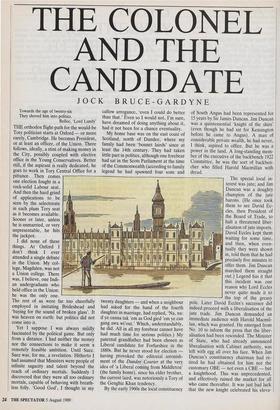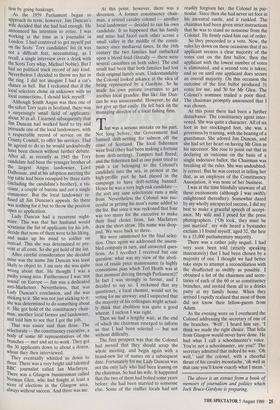THE COLONEL AND THE CANDIDATE
JOCK BRUCE-GARDYNE
Towards the age of twenty-six They shoved him into politics.
Belloc, 'Lord Lundy'
Yet I suppose I was always mildly fascinated by the political game. But only from a distance. I had neither the money nor the connections to make it seem a remotely feasible ambition. Until Suez. Suez was, for me, a revelation. Hitherto I had assumed that Ministers were people of infinite sagacity and talent beyond the reach of ordinary mortals. Suddenly I discovered that they were all too ordinary mortals, capable of behaving with breath- less folly. 'Good God', I thought in my callow arrogance, 'even I could do better than that.' Even so I would not, I'm sure, have dreamed of doing anything about it, had it not been for a chance eventuality.
My home base was on the east coast of Scotland, north of Dundee, where my family had been 'bonnet lairds' since at least the 14th century. They had taken little part in politics, although one forebear had sat in the Scots Parliament at the time of the Commonwealth (according to family legend he had spawned four sons and twenty daughters — and when a neighbour had asked for the hand of the fourth daughter in marriage, had replied, 'Na, na: if ye canna tak 'em as God gied 'em ye can gang awa wi'out.' Which, understandably, he did. All in all my forebear cannot have had much time for serious politics.) My paternal grandfather had been chosen as Liberal candidate for Forfarshire in the 1880s. But he never stood for election having provoked the editorial astonish- ment of the Dundee Courier at the very idea of 'a Liberal coming from Middleton' (the family home), since his elder brother, the current laird, was notoriously a Tory of the Genghiz Khan tendency.
By the early 1960s the local constituency of South Angus had been represented for 15 years by Sir James Duncan. Jim Duncan was a quintessential 'knight of the shire' (even though he had sat for Kensington before he came to Angus). A man of considerable private wealth, he had never, I think, aspired to office. But he was a power in the land. A long-standing mem- ber of the executive of the backbench 1922 Committee, he was the sort of backben- cher who filled Harold Macmillan with dread.
The special local in- terest was jute; and Jim Duncan was a doughty champion of the jute barons. (He once took tion by going bankrupt.
As the 1959 Parliament began to approach its term, however, Jim Duncan's wife decided that she had had enough. He announced his intention to retire. I was working at the time as a journalist in London. I had contrived to get myself put on the Scots' Tory candidates' list (it was not a difficult feat, necessitating, as I recall, a single interview over a drink with the Scots Tory whip, Michael Noble). But I had no political track record of any kind. Nevertheless I decided to throw my hat in the ring. I did not imagine I had a cat's chance in hell. But I reckoned that if the local selectors chose an unknown with no local connections, I should kick myself.
Although South Angus was then one of the safest Tory seats in Scotland, there was a surprisingly small field of applicants: about 30 in all. I learned subsequently that Jim Duncan had worked hard to try and Persuade one of the local landowners, with a respectable record of service on the County Council, to offer his services. Had he agreed to do so he would undoubtedly have been chosen without further debate. After all, as recently as 1945 the Tory candidate had been the younger brother of the largest Angus landowner, Lord Dalhousie, and at his adoption meeting the top table had been occupied by three earls (including the candidate's brother), a vis- count, a couple of barons and not a single Commoner. But the local landowner re- fused all Jim Duncan's appeals. So there was nothing for it but to throw the position open to application. Lady Duncan had a recurrent night- mare. This was that her husband would scrutinise the list of applicants for his job, decide that none of them were to his liking, and make up his mind to soldier on instead. This she was determined to pre- -vent at all costs. So she got hold of the list.
After careful consideration she decided mine was the name Jim Duncan was least likely to object to. I am sure she was quite wrong about that. He thought I was a pushy young man. Furthermore I was 'not sound' on Europe — Jim was a dedicated anti-Marketeer. Nevertheless, that was Lady Duncan's conclusion, and she was sticking to it. She was not just sticking to it: she was determined to do something about it. She got hold of the constituency chair- man, another local farmer and landowner, and told him to see that I got the job. That was easier said than done. The selectorate — the constituency executive, a body of some 60 representatives of the branches — met and set to work. They got the 30 applicants down to about a dozen, whom they then interviewed. They eventually whittled us down to three. There was a very bright and talented BBC journalist called Ian Maclntyre. There was a Glasgow businessman called Norman Glen, who had fought at least a score of elections in the Glasgow area, always without success. And there was me. At this point, however, there was a diversion. A former constituency chair- man, a retired cavalry colonel — another local landowner — decided to run his own candidate. It so happened that his family and mine had faced each other across a small valley in the middle of the consti- tuency since mediaeval times. In the 16th century the two families had embarked upon a blood feud (literally — there were several casualties on both sides). The end result had been that both families had lost their original family seats. Understandably the Colonel looked askance at the idea of being represented by a Gardyne. So he made his own private overtures to get another local grandee. But like Jim Dun- can he was unsuccessful. However, he did not give up that easily. He fell back on the managing director of a local fishing firm.
That was a serious mistake on his part, Not long before, the Government had banned drift-netting for salmon off the coast of Scotland. The local fishermen were livid (they had been making a fortune from drift-netting). Tempers had flared; and the fishermen had at one point tried to push a car belonging to the Colonel's candidate into the sea, in protest at the high-profile part he had played in the campaign to have drift-netting banned. Hence he was a very high-risk candidate — the sort any sane selectorate runs a mile from. Nevertheless the Colonel was suc- cessful in getting his man's name added to the list. But since it was reckoned that four was too many for the executive to make their final choice from, Ian Maclntyre drew the short straw. His name was drop- ped. We were back to three.
We were summoned for the final selec- tion. Once again we addressed the assem- bled company in turn, and answered ques- tions. As I recollect I received but one question: what was my view of the aboli- tion of resale price maintenance (a highly contentious plan which Ted Heath was at that moment driving through Parliament)? In fact I was strongly in favour, and I decided to say so. I reckoned that my questioner, a local chemist, would not be voting for me anyway; and I suspected that the majority of his colleagues might actual- ly think that abolition was quite a good wheeze. I reckon I was right.
Then we had a lengthy wait, at the end of which the chairman emerged to inform us that I had been selected — but not without difficulty.
The first prospect was that the Colonel had moved that they should scrap the whole meeting, and begin again with a brand-new list of names on a subsequent date. Fortunately for me Lady Duncan was not the only lady who had been leaning on the chairman. So had his wife. It happened that the two of them had bolted some years before: she had been married to someone else. Some of the stuffier locals had not readily forgiven her, the Colonel in par- ticular. Since then she had never set foot in his ancestral castle, and it rankled. The chairman had been given strict instructions that he was to stand no nonsense from the Colonel. He firmly ruled him out of order.
So they proceeded to a vote. Now, the rules lay down on these occasions that if no applicant secures a clear majority of the votes cast on the first ballot, then the applicant with the lowest number of votes is eliminated, and a second vote is taken; and so on until one applicant does secure an overall majority. On this occasion the outcome of the first ballot produced 31 votes for me, and 30 for Mr Glen. The Colonel's nominee trailed a poor third. The chairman promptly announced that I was chosen.
At this point there had been a further disturbance. The constituency agent inter- vened. She was quite a character. All of six foot in her stockinged feet, she was a governess by training, with the bearing of a guardsman. She adored Jim Duncan, and she had set her heart on having Mr Glen as his successor. She rose to point out that in declaring an outcome on the basis of a single indecisive ballot, the Chairman was breaking all the rules. She was undoubted- ly correct. But he was correct in telling her that, as an employee of the Constituency Association, it was none of her business.
I was at the time blissfully unaware of all these excitements (although I was swiftly enlightened thereafter). Somewhat dazed by my wholly unexpected success, I did my best to make a graceful speech of accept- ance. My wife and I posed for the press photographers. (`Oh look, they must be just married', my wife heard a bystander exclaim.) I found myself, aged 32, the heir to a 13,000 parliamentary majority.
There was a rather jolly sequel. I had very soon been told (strictly speaking inaccurately) that I had been chosen by a majority of one. I thought we had better take steps to attempt a reconciliation with the disaffected as swiftly as possible. I obtained a list of the chairmen and secre- taries of each of the 60 or so constituency branches, and invited them all to a drinks party at my family home. When they arrived I rapidly realised that most of them did not know their fellow-guests from Adam.
As the evening wore on I overheard the Colonel addressing the secretary of one of the branches. 'Well', I heard him say, 'I think we made the right choice. That fella from Glasgow would never have done. He had what I call a schoolmaster's voice. You're not a schoolmaster, are you?' The secretary admitted that indeed he was. 'Oh well,' said the colonel, with a cheerful thrust of his cavalry moustache, `oh well in that case you'll know exactly what I mean.'
The above is an extract from a book of memoirs of journalism and politics which Jock Bruce-Gardyne is preparing.



















































 Previous page
Previous page